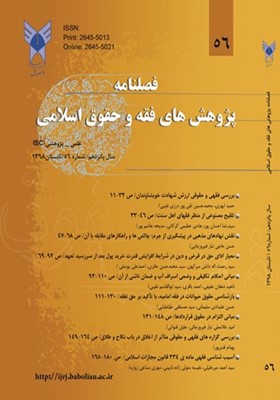مبانی التزام در حقوق قراردادها
محورهای موضوعی : حقوق خصوصیامید غلامعلی تبار فیروزجائی 1 , جلیل قنواتی 2
1 - دانشجوی دکتری حقوق خصوصی، دانشگاه علم و فرهنگ، تهران، ایران
2 - دانشیار حقوق خصوصی، دانشکده حقوق پردیس فارابی، دانشگاه تهران، قم، ایران
کلید واژه: اعتماد, اخلاق, قانون, عدالت, تراضی, عوض,
چکیده مقاله :
در تعامل حقوقی انسان ها با یکدیگر قرارداد شکل می گیرد و افراد خود را وفادار و ملزم به این قرارداد می دانند و عهد شکستن را مذموم و سزاوار پرداخت خسارت می شمارند و به حکم همین قرارداد است که شخص ملتزم و متعهد به انجام امری می گردد و از سوی دیگر این تعهدات دارای قدرت اجبار کننده ای می باشند که به شکل ضمانت اجرای آن متبلور و از صرف وعده های اخلاقی متمایز می گردند. منشأ قدرت التزام از کجا نشأت می گیرد؟ در مقام پاسخگویی به این مسأله نظریات متعدد مطرح گردید که هر یک از نظریات طرفداران بسیار دارند، از جمله حاکمیت اراده ، تراضی، قانون، عدالت و ... از این میان طرفداران نظریه اراده که بر قصد تأکید می کنند، اراده را تنها منشأ التزام به قرارداد تلقی می نماید. اما به نظر نمی آید تنها اراده فردی که معمولاً به دنبال جذب منافع شخصی است در این الزام و التزام مؤثر باشد، بلکه قرین این اراده فردی باید نقش اراده جمعی انسانها که در پی جذب مصالح و منافع عمومی تجلی می نماید، توجه کرده و به آن اذعان نمود.
In the legal interactions of humans, a contract is made and the people obligate themselves to this contract and the decree is prohibited and deserves compensation, and due to this contract, a person committed for doing something and on the other hand, these obligations have compelling powers that are crystallized in the form of its implementation and are distinguished from ethical promises. Where does the source of obligation come from? In responding to this question, many ideas were raised that each of the opinions has many followers, including the rule of will, constraint, law, justice etc. and among them, the advocates of this theory which emphasize on intention, make the will only the source of the obligation to contract. But it does not seem that the only will of the person who usually seeks to attract personal interests is effective in this obligation and commitment, but along with this individual will, one has to pay attention to the role of the collective will of humans seeking to attract the interests of the people, and finally it is acknowledged.
Atiyah, P.S. (1988). Freedom of contract. Oxford: Oxford Press.
Atiyah, P. S. (1979). The rise and fall of freedom of contract. Oxford. Clerendon Press.
Atiyah, P. S. (1989). The law of contract. Oxford. Clerendon Press.
Barnett, R. (1986). A consent theory of contract. New York: Columbia Law Review.
Ghestin, J. (1980). Traite de Drort Civil. Paris: L.G.D.J.
Guest, A. (1986). Anson's law of contract. Oxford: Clerendon Press.
Harris, D. &Tallon, D. (1991). Contract law. Oxford: Clarendon Press.
Murray, J. E. (1990). Murray on contracts. Virginia: Michle Company.
Nicholas, B. (1992). French law of contract. Oxford: Clarendon Press.
Ripert, G. (1949). La regle Morale dans Les Obligation Civiles. Paris: Paris Publisher.
Thomas, S. (1996). A casebook on contract. London: Sweet & Maxwell.
Treitel,G.H. (1995). The law of contract. London: Sweet & Maxwell.
Wheeler, S. (1994). Contract law. Oxford: Clarendon Press.
Zeimmerinan, R. (1996). The law of obligation. Oxford: Clarendon Press.
_||_ABi, Z. (No date). Al-Muroz. Qom: Al-Nashr Al-Islam.
Al-Kashfelaghat, M. (1941). Tahrir Al-Maghaj. Najaf: Najaf Printing.
Amali, M. (1993). Naha Al-Maram. Qom: Al-Nashr Al-Islam.
Ansari, M. (2002). Al-Mekasb A'zam. Qom: Islamic Publication Office.
Ardebili, A.(1983). Al-Faydeh and Al-Baheran Faye ıršad Al-Ah'ahan, Qom: Islamic Publications Office.
Atiyah, P. S. (1979).The rise and fall of freedom in contract. Oxford: Clerendon Press.
Atiyah, P. S. (1989). The law of contract(4th ed.). Oxford: Clerendon Press.
Atiyah, P.S. (1988). the Rise and fall of freedom of contract. Oxford: Clarendon Press.
Bahrani, Sh. (No date). Al-Hada'gh Al-Nazareh. Qom: Islamic Publication Institute.
Barry, N. (1992). The French law of contract ( 2nd ed.). Oxford: Clarendon Press.
Ghestin, J. (1980). Traite de Drort Civil, Les Obligations. Paris: Le Contrat.
Gordley, J. (2011). the philosophical origins of modern contract Doctrine. New York: United States Press.
Guest, A.G. (1986). Anson's law of contract. Oxford: Clerendon Press.
Hamedani, R. (1983). Mesbah Al- Faghih (4th ed.). Tehran: Maktab al-Sadiq.
Harris, D., Tallon, D. (1991). Contract law. Oxford: Clarendon Press.
Ibn-Edris, M. (1990). Al-Sarayar Al-Hawi, Al-Dawi's Imprisonment. Qom: Islamic Publication Office.
Jafarine, M. (1991). Law of obligations (2nd ed.). Tehran: Tehran University Press.
Kant, E. (1999). Lessons in ethics philosophy. Tehran: Razavi and Negar Publication.
Karaki, A. (1991). Jami Al-Emsoed (4th ed.). Beirut: Salah Al-Torath.
Katouzian, N. (1989). General rules of contracts (1st ed.). Tehran: Behneshar Publishing House.
Katouzian, N. (1995). The general principles of obligations (1st ed.). Tehran :Yalda Publishing House.
Khoei, S. (No date). Mesbah Al-Bukhahte (7th ed.). Beirut: Dar Al-Alam School.
Makarem Shirazi, N. (1991). Al-Qawad Al-Fiqahiyah(3rd ed.). Qom: Imam Ali School.
Murray, J. (1990). Murray on contracts(3rd ed.). Virginia: The Michle Company Law Publishers.
Musavi, R.(1990). Al-Rasilej. Qom: Islamic Institute.
Naraghi, A. (1997). Aveed Al-Ayam. Qom: Al-Nashr Institute.
Ripert, G. (1949). La regle Morale dans Les Obligation Civiles. Paris.
Shahidi, M. (2004). Principles of contracts and commitments (3rd ed.). Tehran: Majd Publication.
Tabatabaei, M. (2000). Al-Aroo Al-Vattiqi. Qom: Al-Nasir Al-Islam.
Tousi, M. (No date). Al-Tabayan Fi Tafsir Al-Quran. Beirut: Darahiya Al-Torath Al-Arabi.
Treitel, G.H. (1995). The law of contract (9th ed.) London: London Publication.
Wheeler, S. S. J. (1994). Contract law. Oxford: Clarendon Press.
Yazdi, M. (1997). Question and answer. Tehran : Center for the Publication of Islamic Sciences.
Zeimmerinan, R. (1996). The Law of obligation. Oxford: Clarendon Press.


